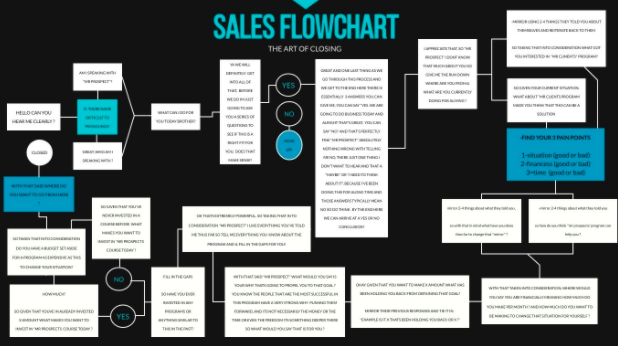Business
Here’s How You Can Scale Your Sales To 100K+ in 3 Months With Ambro Di Pilato

As human beings, sometimes all we need is a sign to turn our entire lives around. The moment does not have to be magical and extraordinary, nor does it have to be extravagant. A lot of the time, our life-changing instances come from very ordinary yet impactful events, like a couple of harsh words from someone. Such is the story of Ambro Di Pilato, the 21-year-old entrepreneur who changed his life around after realizing the value of his own freedom.
Ambro Di Pilato is the founder of The Stratton Sales Agency, an agency that has assists businesses in scaling their monthly sales to over $100,000 in just a few months. Coming from a middle-class family with a passion for art, Di Pilato has made a mark as one of the aspiring entrepreneurs in Canada and continues to grow his footprint by serving clients from all over the world.
The key to his success is the fact that Ambro mastered the art of selling at a young age. Ambro’s professional life started when he stepped into the world of art and helped connect several artists to potential buyers. Within a few months of entering into the field, Ambro arranged successful art exhibitions with hundreds of attendees and found Ambro Galleries, one of the largest franchises of pop-up galleries in Canada. It would be safe to say that through the art industry, Ambro mastered the art of selling.
In other words, selling became Ambro’s expertise. Soon, he transitioned these skills into his second and most successful venture, his sales agency. So far, the Stratton Sales Agency has helped several businesses in scaling their monthly sales from a couple of thousands to six-digit figures by closing high-ticket deals on their behalf. The agency’s clientele includes some of the top entrepreneurs and brands from different parts of the world.
According to Ambro, in today’s competitive world, your businesses’ success depends on how effectively you can market and sell your product or service, and that’s where most entrepreneurs lack. This is the reason why many businesses fail to survive – let alone grow. No matter how great the strategies of your company are, if you fail at convincing the party in front of you to buy, all of it will be of no use. This is where Stratton Sales Agency comes into play. Here’s what they do:

Ambro and his team at Stratton take care of the selling aspect of businesses so that their clients so that they can focus more on what they are offering instead of worrying about how to sell it. They do so through high-ticket sales, which is one of the best ways to achieve sales growth in a relatively short period of time. The best part? Ambro’s clients do not have to make huge investments upfront. He believes in turning low ticket sales to high ticket sales for his customers. Essentially, he is only helping his customers with enhancing sales. Each transaction by the sales agency is closed by Ambro himself, making them as transparent as possible.
For Ambro, it’s more than just making a profit; it’s about ensuring that his clients get the best every time. This is the reason why he has a small yet efficient team, hand-picked by Ambro himself. The individuals he trains and brings on board are much like himself; they are well-versed with the language of selling. At first, they are given small projects where they are taught how to effectively close deals. Once they learn the tips and tricks and become familiar with how the industry works, they are given bigger deals that usually worth $500,000 and above.
The dedication and hard work that Ambro Di Pilato has put into The Stratton Sales Agency truly shows. Had it not been for his efforts, most of his clients and their businesses wouldn’t have been able to grow beyond a particular point.
Business
13 Reasons Investors Are Watching Phoenix Energy’s Expansion in the Williston Basin

As energy security becomes a growing priority in the United States, companies focused on domestic oil production are gaining attention from investors. One such company is Phoenix Energy, an independent oil and gas company operating in the Williston Basin, a prolific oil-producing region spanning North Dakota and Montana.
Phoenix Energy has established itself as a key player in this sector, expanding its footprint while offering structured investment opportunities to accredited investors. Through Regulation D 506(c) corporate bonds, the company provides investment options with annual interest rates ranging from 9% to 13%.
Here are 13 reasons why Phoenix Energy is attracting investor interest in 2025:
1. U.S. energy production remains a strategic priority
The global energy landscape is evolving, with a renewed focus on domestic oil and gas production to enhance economic stability and reduce reliance on foreign energy sources. The Williston Basin, home to the Bakken and Three Forks formations, continues to play a critical role in meeting these demands. Phoenix Energy has established an operational footprint in the basin, where it is actively investing in development and production.
2. Investment opportunities with fixed annual interest rates
Phoenix Energy bonds offer accredited investors annual interest rates between 9% and 13% through Regulation D 506(c). These bonds help fund the company’s expansion in the Williston Basin, where it acquires and develops oil and gas assets.
3. Record-breaking drilling speeds in the Williston Basin
Phoenix Energy has made significant strides in drilling efficiency, ranking among the fastest drillers in the Bakken Formation as of late 2024. By reducing drilling times, the company aims to optimize operations and improve overall production performance.
4. Expansion of operational footprint
Since becoming an operator in September 2023, Phoenix Energy has grown rapidly. As of March 2025, the company has 53 wells drilled and 96 wells planned over the next 12 months.
5. Surpassing production expectations
Phoenix Energy’s oil production has steadily increased. By mid-2024, its cumulative production had exceeded 1.57 million barrels, outpacing its total output for 2023. The company projected an exit rate of nearly 20,000 barrels of oil equivalent per day by the end of March 2025.
6. High-net-worth investor offerings
For investors seeking alternative investments with higher-yield opportunities, Phoenix Energy offers the Adamantium bonds through Reg D 506(c), which provides corporate bonds with annual interest rates between 13% and 16%, with investment terms ranging from 5 to 11 years, and a minimum investment of $2 million.
7. Experienced team with industry-specific expertise
Phoenix Energy’s leadership and technical teams include professionals with decades of oil and gas experience, including backgrounds in drilling engineering, land acquisition, and reservoir analysis. This level of in-house expertise supports the company’s ability to evaluate acreage, manage operations, and execute its long-term development plans in the Williston Basin.
8. Focus on investor communication and understanding
Phoenix Energy prioritizes clear investor communication. The company hosts webinars and provides access to licensed professionals who walk investors through the business model and operations in the oil and gas sector. These efforts aim to help investors better understand how Phoenix Energy deploys capital across mineral acquisitions and operated wells.
9. Managing market risk through strategic planning
The energy sector is cyclical, and Phoenix Energy takes a structured approach to risk management. The company employs hedging strategies and asset-backed financing to help mitigate potential fluctuations in the oil market.
10. Commitment to compliance
Phoenix Energy conducts its bond offerings under the SEC’s Regulation D Rule 506(c) exemption. These offerings are made available exclusively to accredited investors and are facilitated through a registered broker-dealer to support adherence to federal securities laws. Investors can review applicable offering filings on the SEC’s EDGAR database.
11. Recognition for business practices
As of April 2025, Phoenix Energy maintains an A+ rating with the Better Business Bureau (BBB) and is a BBB-accredited business. The company has also earned strong ratings on investor review platforms such as Trustpilot and Google Reviews, where investors often highlight clear communication and transparency.
12. A family-founded business with a long-term vision
Led by CEO Adam Ferrari, Phoenix Energy operates as a family-founded business with a focus on long-term investment strategies. The company’s leadership emphasizes responsible growth and sustainable development in the Williston Basin.
13. Positioned for long-term growth in the oil sector
With U.S. energy demand projected to remain strong, Phoenix Energy is strategically positioned for continued expansion. The company’s focus on efficient drilling, financial discipline, and structured investment offerings aligns with its goal of building a resilient and growth-oriented business.
Final thoughts
For investors looking to gain exposure to the U.S. oil and gas sector, Phoenix Energy presents an opportunity to participate in a structured alternative investment backed by the company’s operational expansion in the Williston Basin.
Accredited investors interested in learning more can attend one of Phoenix Energy’s investor webinars, which are hosted daily throughout the week. These sessions provide insights into market trends, risk management strategies, and investment opportunities.
For more information, visit the Phoenix Energy website.
Phoenix Capital Group Holdings, LLC is now Phoenix Energy One, LLC, doing business as Phoenix Energy. The testimonials on review sites may not be representative of other investors not listed on the sites. The testimonials are no guarantee of future performance or success of the Company or a return on investment. Alternative investments are speculative, illiquid, and you may lose some or all of your investment. Securities are offered by Dalmore Group member FINRA/SIPC. Dalmore Group and Phoenix Energy are not affiliated. See full disclosures.
This article contains forward-looking statements based on our current expectations, assumptions, and beliefs about future events and market conditions. These statements, identifiable by terms such as “anticipate,” “believe,” “intend,” “may,” “expect,” “plan,” “should,” and similar expressions, involve risks and uncertainties that could cause actual results to differ materially. Factors that may impact these outcomes include changes in market conditions, regulatory developments, operational performance, and other risks described in our filings with the U.S. Securities and Exchange Commission. Forward-looking statements are not guarantees of future performance, and Phoenix Energy undertakes no obligation to update them except as required by law.
-

 Tech4 years ago
Tech4 years agoEffuel Reviews (2021) – Effuel ECO OBD2 Saves Fuel, and Reduce Gas Cost? Effuel Customer Reviews
-

 Tech6 years ago
Tech6 years agoBosch Power Tools India Launches ‘Cordless Matlab Bosch’ Campaign to Demonstrate the Power of Cordless
-

 Lifestyle6 years ago
Lifestyle6 years agoCatholic Cases App brings Church’s Moral Teachings to Androids and iPhones
-

 Lifestyle4 years ago
Lifestyle4 years agoEast Side Hype x Billionaire Boys Club. Hottest New Streetwear Releases in Utah.
-

 Tech6 years ago
Tech6 years agoCloud Buyers & Investors to Profit in the Future
-

 Lifestyle5 years ago
Lifestyle5 years agoThe Midas of Cosmetic Dermatology: Dr. Simon Ourian
-

 Health6 years ago
Health6 years agoCBDistillery Review: Is it a scam?
-

 Entertainment6 years ago
Entertainment6 years agoAvengers Endgame now Available on 123Movies for Download & Streaming for Free
